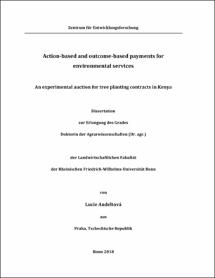Action-based and outcome-based payments for environmental servicesAn experimental auction for tree planting contracts in Kenya

Action-based and outcome-based payments for environmental services
An experimental auction for tree planting contracts in Kenya

| dc.contributor.advisor | Holm-Müller, Karin | |
| dc.contributor.author | Andeltová, Lucie | |
| dc.date.accessioned | 2020-04-24T14:29:07Z | |
| dc.date.available | 2020-04-24T14:29:07Z | |
| dc.date.issued | 25.06.2018 | |
| dc.identifier.uri | https://hdl.handle.net/20.500.11811/7354 | |
| dc.description.abstract | The dissertation represents a first randomized field experiment that compares action-based and outcome-based payments for environmental services (PES). The main aim of the study was to investigate the effect of the outcome-based contracts in conservation auctions, and to prove the theoretical prediction on their improved environmental performance. In addition, the study uses a gender sensitive approach to examine gendered behavior. Tree planting contracts were allocated via conservation auctions in Central Kenya, one making final payments dependent on actions (keeping the soil around the trees moist) and the other on outcomes (tree survivals). The results show (i) a significant increase in women´s bids in the outcome-based versus action-based treatment, suggesting women to react more averse to the outcome-based approach than men. Also, (ii) women submitted significantly lower bids compared to men in the action-based treatment, wherein gendered differences in opportunity costs and cash constrains were identified as potential drivers. Further, (iii) there was no significant difference in budget effectiveness between the auctions for action- and outcome-based contracts. Moreover, (iv) tree survivals were statistically undistinguishable for the action-based and outcome-based treatments, whereas (v) the type of contract, however, played a role in defining care taking actions, with outcome-based contract holders being more likely to conduct conservation activities that are expected to improve tree survivals. Furthermore, (vi) women achieved significantly less surviving trees than men, wherein gender imbalance in mutual labor support in the contract implementation was identified as potential driver for the lower performance. In this respect, despite the decline in women's tree survivals, the contract allocation to women was still highly cost-effective. In addition, (vii) tree survivals were increasing with the payment amount, implying that decreasing the gap between informational rents and true opportunity costs might negatively affect the environmental performance. Finally, (viii) the overall high tree survivals might be in the first place motivated by the payments and expected future tree benefits, wherein a number of factors also suggest on intrinsic motivation for tree survivals. | |
| dc.language.iso | eng | |
| dc.rights | In Copyright | |
| dc.rights.uri | http://rightsstatements.org/vocab/InC/1.0/ | |
| dc.subject.ddc | 630 Landwirtschaft, Veterinärmedizin | |
| dc.title | Action-based and outcome-based payments for environmental services | |
| dc.title.alternative | An experimental auction for tree planting contracts in Kenya | |
| dc.type | Dissertation oder Habilitation | |
| dc.publisher.name | Universitäts- und Landesbibliothek Bonn | |
| dc.publisher.location | Bonn | |
| dc.rights.accessRights | openAccess | |
| dc.identifier.urn | https://nbn-resolving.org/urn:nbn:de:hbz:5n-51209 | |
| ulbbn.pubtype | Erstveröffentlichung | |
| ulbbnediss.affiliation.name | Rheinische Friedrich-Wilhelms-Universität Bonn | |
| ulbbnediss.affiliation.location | Bonn | |
| ulbbnediss.thesis.level | Dissertation | |
| ulbbnediss.dissID | 5120 | |
| ulbbnediss.date.accepted | 20.12.2017 | |
| ulbbnediss.institute | Landwirtschaftliche Fakultät : Institut für Lebensmittel- und Ressourcenökonomik (ILR) | |
| ulbbnediss.fakultaet | Landwirtschaftliche Fakultät | |
| dc.contributor.coReferee | von Braun, Joachim |
Dateien zu dieser Ressource
Das Dokument erscheint in:
-
E-Dissertationen (1004)




